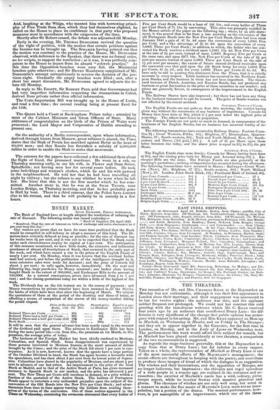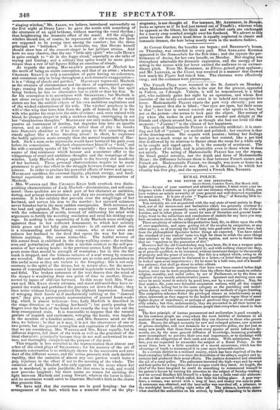THE THEATRES.
THE reception of Mr. and Mrs. CHARLES KEAN at the Haymarket on Monday was not enthusiastic, although it was their first appearance in London since their marriage, and their engagement was announced to be but for twelve nights : the audience was thin, and the applause neither frequent nor prolonged. We could not but contrast this cold greeting with the tumultuous welcome which Mr. C. KEAN received four years ago by an audience that overflowed Drury Lane : the dif- ference is very significant of the change that public opinion has under- gone with respect to his acting. Mr. and Mrs. KEAN appeared on Monday in Macbeth, on Wednesday in Hamlet, and on Friday in The Stranger; and they are to appear together in the Gamester, for the first time in London, on Monday, and in the Lady of Lyons on Wednesday next. The performances this week would afford little subject for remark, but as Macbeth has been played coincidently at two theatres, a comparison of the two representations is suggested.
As regards the stage-business generally, this at the Haymarket is a copy from that at Drury Lane ; but far inferior in every respect. Taken as a whole, the representation of Macbeth at Drury Lane is one of the most successful efforts of Mr. MACREADY'S management: the scenic effects are throughout in keeping with the poetry, and contribute to produce those images of dread of which the dialogue is so suggestive. The witches and their incantations, and the apparition of Banquo, are no longer ludicrous, but impressive : the chivalry and regal splendour of a rude people in a remote age are realized in the costumes and ac- cessories; the exterior of Macbeth's castle has a wild, solitary, pictu- resque aspect, while its interior frowns with massive grandeur and gloom. The choruses of witches are not only well sung, but acted in a manner to make the fine music of MATTHEW LOCK seem not an inter- polation, but a portion of the drama. The musical performance, how- ever, is yet susceptible of an improvement, which one of the three
" singing-witches," Mr. Ammar, we believe, introduced successfully on the first night at Drury Lane : he gave the words with something of the utterance of an aged beldame, without marring the vocal rhythm ; thus heightening the dramatic effect of the music. All the singing- witches should not, of course, be represented as old women, for there are supposed to be young ones among the number ; but the three principal are " beldames." It is desirable, too, that Hecate herself should show less of the concert-singer in her jubilant strains. And here we may observe, that the one "little airy spirit" who calls Hecate is quite enough to "sit in the foggy cloud," especially as she talks of toying and kissing ; and a solitary tiny sprite would be more pictu- resque than a row of tall figures filling an omnibus of clouds.
As regards the acting, MACREADY'S personation of Macbeth has the merit of being an entire conception, and that of an artist ; whereas CHARLES KEAN'S is only a succession of parts having no coherence, and consistent only in being throughout a melodramatic exaggeration— it is a "thing of shreds and patches." MACREADY represents Macbeth as the creature of circumstance and the slave of supernatural prompt- ins; rousing his manhood only to desperation when, the last spell being broken, he has no alternative but to yield or dare his fate. So far his conception is in accordance with SHARSPERE ; but Macbeth is not alone swayed by skyey influences ; the predictions of the weird sisters are but the audible echoes of his own ambitious aspirations and of the wicked exhortations of his wife. The witches' prophecy is the will-o'-the-wisp that lures him from the path of honour, but it is his wife who guides his steps into the mire of crime ; and, once stained with blood, he plunges deeper in with a reckless daring, outstripping in act her "slaughterous thoughts." MACREADY not only makes Macbeth too passive an instrument of destiny, but degrades him into an ignoble craven, and an object cf contempt rather than of pity : he sneaks into Duncan's chamber as if he were going to filch something, and stands aghast like a felon dreading arrest : in short, he expresses the bodily agitation more strongly than the mental inquietude of Mac- beth. Such a man as he represents would have betrayed his guilt even before its commission. Macbeth characterizes himself as "bold," and his wife constantly speaks of his "noble nature": this nobleness is the source of that resistance which honour and conscience offer to the whisperings of cruel and ambitious thoughts and the ternptings of the witches. Lady Macbeth always appeals to the bravery and manhood of her husband. These personal characteristics require to be made prominent to give due effect to the struggle between courage and con- science. In order to produce his powerful effects of terror and agony, MACREADY sacrifices the external dignity, physical energy, and intel- lectual superiority that are essential to a complete personation of Macbeth.
s. Mrs. WARNER and MIS. CHARLES KEAN both overlook two distin- guishing characteristics of Lady Macbeth—dissimulation, and self-com- mand: these qualities are as much part of her character as ambition, daring, and prompt determination ; and they are constantly called into exercise. It is her subtlety that prevails over the misgivings of her husband, and nerves his arm to the murder : her outward calmness never forsakes her in the most sudden emergencies. Both actresses are too loud and agitated, Mrs. WARNER especially : they taunt Macbeth with the vehemence of scolds, instead of addressing his mind with arguments to fortify his wavering resolution and recal his sinking cou- rage. In nothing is the superiority of Lady Macbeth more strikingly apparent than in her collected demeanour, to which her subtlety lends grace and her lofty aim grandeur : in all outward show she is a commanding and fascinating woman, who at once awes and seduces her husband to the deed that opens the way for her am- bitions aspirings. She seems statue-like. The fearful reverse of this serene front is exhibited in the sleep-walking scene : the restless- ness and perturbation of guilt form a terrible contrast to the self-pos- session of her waking hours : in the previous scenes Lady Macbeth ap- pears more than mortal in strength of resolution ; but in this the fair mask is dropped, and the hideous tortures of a soul wrung by remorse are revealed. But our modern actresses are as calm and passionless in this awful scene as they are violent in the foregoing: this is not only contrary to the spirit of the drama, but to nature also ; for the move- ments of somnambulism caused by mental inquietude would be hurried and fitful. The broken sentences of the text denote that the mind of the sleeper is wandering from one point of time to another, discon- nected by lapses of oblivion between. In this scene both Mrs. WAR- NER and Mrs. KEAN slowly advance, and stand still until they have re- peated the words and performed the gestures set down for them ; they then retire without having produced the slightest impression. Instead of wringing their hands as if mechanically rubbing at the " damned spot," they give a pantomimic representation of genteel hand-wash- ing, which is almost ludicrous : true, Lady Macbeth is described in the stage-direction as " washing her hands"; but gently passing the fingers over the back of the hand is not exactly the way to rub out the deep ensanguined stain. It is reasonable to suppose that the natural gesture of anguish and excitement, wringing the hands, was implied an the mention of a familiar action ; and Mrs. SIDDONS acted on this idea, we believe : be that as it may, it is not the observance of one or two points, but the general conception and expression of the character, that we are considering. Mrs. WARNER and Mrs. KEAN equally, but in different degrees, fall short of the truth as well as the grandeur of the ideal character; principally because they do not well understand its na- ture, nor thoroughly comprehend the purpose of the poet.
This tragedy is less curtailed in the representation than almost any other of the acted plays of SHARSPERE ; for his mastery of the art of dramatic construction is so strikingly shown in the succession and con- duct of the different scenes, and the action proceeds with such decisive rapidity, that the omission of almost any one portion would leave a gap, injurious to the effect if not to the meaning of the whole. The omission of Lady Macduff, who only appears in the scene where her son is murdered, is quite justifiable, for that scene is weak, and would now provoke laughter : but there seems no reason for omitting the fight between Macbeth and young Siward, wherein the latter is slain; and its enactment would serve to illustrate Macbeth's faith in the charm that protects him.
We have said that the costumes are in good keeping: but the arrangement of the hair, which has a material effect on the phy-
siognomy, is not thought of. For instance, Mr. ANDERSON, in Banque, looks as spruce as if he had just turned out of Truefit's ; whereas when be appears as the Ghost, his thick and well-oiled curls are exchanged for a scanty crop combed straight over his forehead. We advert to this point because the men's head-dress is equally neglected in classic and romantic dramas, the hair being mostly worn in the modern fashio3.



























 Previous page
Previous page